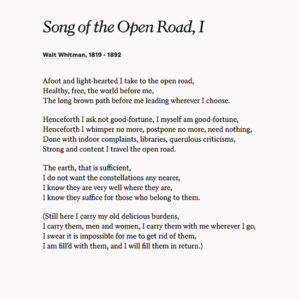마이 웨스턴 아메리카 포폴 페이지
*Scroll down to EN ver. ↓
〈마이 웨스턴 아메리카〉는 윌트 휘트먼(Walt Whitman)의 시 Song of the open road를 읽고 시작된 작업으로, 미국 서부 일대를 자동차로 43일간, 5352.7km 달려 촬영한 풍경이다.
작가는 휘트먼의 시를 읽고 자신이 속한 익숙함에서 벗어나 의식적으로 가장 낯선 곳으로 향하고자 하였는데, 결국 최종적으로 선택된 촬영지인 미국 서부에 도착한 후 눈앞의 풍경들이 그간 보아온 할리우드(Hollywood) SF 영화를 통해 무의식 속에서 익숙한 곳임을 깨닫는 아이러니함을 경험한다.
“내가 마주하는 풍경들이 좀 더 영화 속의 한 장면처럼, 우리의 잠재의식에 형성된 화성의 표면처럼 나오길 기대하며, 이런 친숙함과 낯설고 두려운 감정 사이에서 작업을 이어갔다. TV나 영화를 통해 수십 번은 넘게 가봤을, 그 상상 속의 장소들은 오히려 한국 어느 지방의 시골 풍경보다 익숙했다. 컬러와 흑백을 모두 염두에 두고 작업하였는데, 마지막 셀렉을 하면서 “오래된 흑백 풍경사진 문법을 따르는 것처럼” 보이고자 했다. 그러나 내 사진 속의 풍경들은 옛날의 그들처럼 평온하게 아름답지만은 않다. 나는 ‘모험’이라는 단어가 환상의 탈출구이자 빈번한 좌절을 통한 통제로 작동하는 시스템에 속해 있기 때문이다.”
The project My Western America began after reading Walt Whitman’s poem “Song of the Open Road”. It features landscapes captured during a 43-day, 5352.7 km road trip through the Western America by car.
Kim, after reading Whitman’s poem, intentionally sought to move away from the familiarity they belonged to and venture into the most unfamiliar places. However, upon arriving at the chosen shooting location in the American West, they experienced the irony of realizing that the landscape they witnessed-it was, in fact, a place familiar to them from the Hollywood science fiction movies they had seen all along.

“Song of the Open Road”, Walt Whitman
“Facing the landscapes, I continued my work caught between familiarity and uncanny-fear, hoping that they would emerge more like scenes from a movie or the surface of Mars ingrained in our subconscious. Ironically, these imagined places, which I had seen countless times through TV and movies, felt more familiar than the rural landscapes of some region in Korea. Considering both color and black-and-white photos, I aimed to make the final selection appear as “if it followed the grammar of old black-and-white landscape photography” However, the landscapes in my photos are not as tranquil and beautiful as they used to be. I am part of a system where the word “Adventure” functions as both an escape from fantasy and a means of control through frequent disappointments.”

Leave a comment